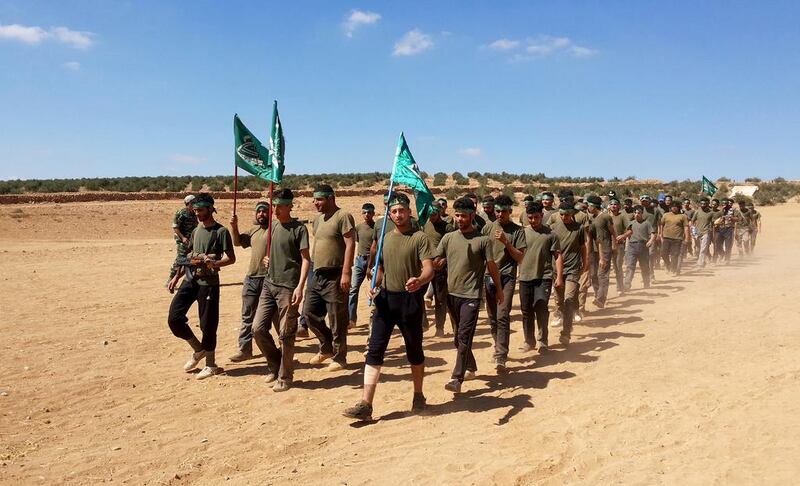Foreign correspondents
AMMAN // The detention of a key moderate rebel leader in southern Syria has underlined the growing power of Al Qaeda on a battlefield in which its influence has long been considered minimal.
Jabhat Al Nusra, Al Qaeda's wing in Syria, captured Ahmed Nehmeh, a former air force colonel who defected and was working closely with the intelligence agencies of western and Gulf states as head of the Deraa Military Council (DMC), part of the Free Syrian Army (FSA).
But Col Nehmeh’s powerful friends and links with armed factions on the ground inside Syria did nothing to prevent him and other rebel officers from being captured in an ambush by Al Nusra on Saturday.
It was a brazen act, and a slap in the face of the moderate rebel groups which have long been the dominant power on Syria’s hard-fought southern front.
FSA factions issued a 48-hour ultimatum for Al Nusra to hand him and the other officers over or face attack. The deadline passed with Col Nehmeh still in Al Nusra’s hands and the FSA backing down, talking instead about negotiations and conciliation.
FSA groups issued a 48-hour ultimatum for Al Nusra to hand him and the other officers over or face attack. The deadline passed with Col Nehmeh still in Al Nusra’s hands and the FSA backing down, talking instead about negotiations and conciliation.
Adding insult to injury, Al Nusra then aired a video showing Col Nehmeh, a fierce critic of Islamic extremist groups, looking battered and bruised and saying that foreign backers of the FSA had deliberately connived to make rebels lose control of a strategically important town on a major supply route, in effect handing it back to the president, Bashar Al Assad.
Regardless of the truth of that “confession” – and it is far from implausible – it is a humiliation for the FSA and their backers. Col Nehmeh has been head of the DMC for 18 months, and knows many of the inner secrets of weapons supplies and funding streams from foreign intelligence agencies to their rebel clients.
While the incident shows Al Nusra – and, by its own definition, Al Qaeda – is not a mere bit player in southern Syria, it does not mean it is yet the dominant power. Rather it points to internal manoeuvring within rebel circles.
Col Nehmeh is unpopular even among supposed allies within the FSA, like the Yarmouk Brigade, who have long complained that his loyalties are to money and foreign intelligence agents, not the Syrian revolution.
He was also an ally of Gen Selim Idriss, the former head of the FSA, who was sacked in February for being ineffective. With him gone, Col Nehmeh’s influence was dramatically curtailed.
Col Nehmeh recently launched a new rebel coalition in southern Syria in what was widely interpreted as an effort to shore up his own power base, at the expense of an already tenuous unity among rebel factions.
Rivalries within the FSA also mean some officers are happy to see Col Nehmeh taken out of the picture, in the hope they can take over his role at the DMC and build up their own client networks through distributing weapons and cash.
Al Nusra must have calculated that FSA commanders on the ground, and at the FSA headquarters in Turkey, would not be willing to start a war over a man they all dislike.
At the same time, the FSA cannot just walk away and pretend none of this has happened. In striking at Col Nehmeh, Al Nusra has struck at the symbol of moderate, western and Gulf-backed power in southern Syria.
Negotiations are currently under way over Col Nehmeh’s fate, with Al Nusra insisting he stand trial for treason. That looks set to happen and there appears to be nothing Col Nehmeh’s western, Gulf and Jordanian backers can do to help him, even if they wanted to.
In taking Col Nehmeh, Al Nusra has made it clear that inside Syria, even on the more moderate, better organised southern front, it, not foreign intelligence agents, call the shots.
psands@thenational.ae





